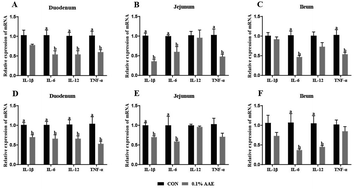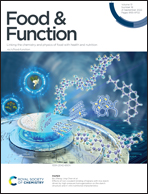Maternal supplementation with Artemisia annua L. ameliorates intestinal inflammation via inhibiting the TLR4/NF-κB and MAPK pathways and improves the oxidative stability of offspring
Abstract
Artemisia annua L. (A. annua) contains artemisinin, which attracts attention on account of its anti-inflammatory and anti-oxidant effects. Increased intestinal inflammation, oxidative stress, and hypoimmunity commonly occur in neonatal and early-weaning piglets. Abundant evidence suggests that maternal nutritional interventions during pregnancy modify the offspring's long-term gut development. The present study was conducted to investigate the effects of maternal A. annua extract (AAE) supplementation on the offspring's intestinal inflammation and redox status. A total of 90 pregnant sows were assigned randomly and equally into the control (CON) group (fed with a basal diet) and the 0.1% (AAE) group (basal diet with 1.0 g kg−1 AAE) during late gestation and lactation. The results showed that 0.1% AAE supplementation significantly decreased the contents and relative mRNA expressions of interleukin (IL)-1β, IL-6, and IL-12, and tumor necrosis factor-α in the small intestine of the newborn and weaned piglets (offspring) (P < 0.05). There were higher activities of total antioxidant capacity and total superoxide dismutase, whereas a lower concentration of malondialdehyde in the small instestine of offspring in the 0.1% AAE group than that in the CON group (P < 0.05). Furthermore, the 0.1% AAE group decreased the mRNA and protein expressions of Toll-like receptor 4 (TLR4) and inhibited the activation of TLR4-mediated nuclear factor kappa B (NF-κB) and mitogen-activated protein kinase (MAPK) signaling pathways (P < 0.05). The mRNA expression of peroxisome proliferator activated receptor γ (PPARγ), porcine beta-defensin (PBD)-1, PBD-2, PBD-3, mucin (MUC)-1, MUC-2 and MUC-4 was significantly enhanced in the small intestine of both neonatal and weanling piglets (P < 0.05). Together, these results showed that maternal 0.1% AAE supplementation improved the redox status and attenuated the neonatal and early-weaning associated inflammatory response in the offspring's small intestine, possibly by suppressing the activation of the TLR4/NF-κB and MAPK inflammatory pathways, and stimulated expressions of beta-defensins, mucins, and PPARγ to promote inflammation resolution and innate immunity response.

- This article is part of the themed collection: Food & Function HOT Articles 2022


 Please wait while we load your content...
Please wait while we load your content...